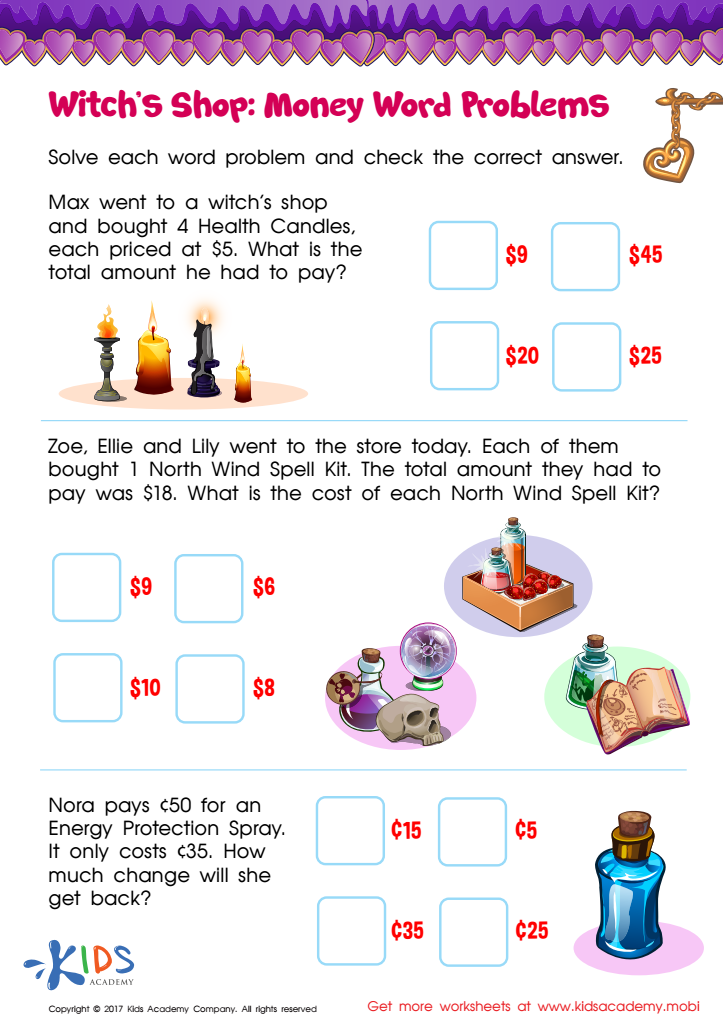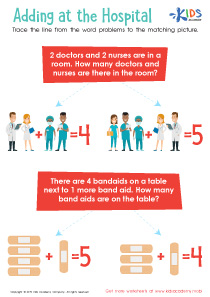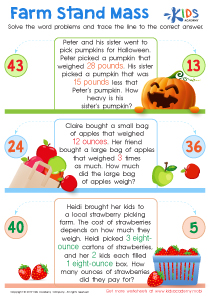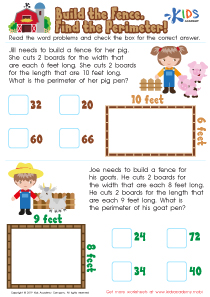Normal Money Word Problems Worksheets for Ages 3-4
1 filtered results
-
From - To
Introduce your little ones to the world of basic finance with our Normal Money Word Problems worksheets, perfectly tailored for children aged 3-4 years. These engaging homeschool online printables are designed to lay the foundation for financial literacy in a fun and interactive way. Each worksheet features simple, age-appropriate problems that help children recognize coins and understand their values through real-life scenarios. Ideal for young learners, these printables foster confidence and curiosity about money management from an early age. Start your child’s journey toward becoming money-savvy with our delightful worksheets today!


Money Word Problems Printable
Understanding the Value of Homeschool Interactive Worksheets on Money Word Problems for Ages 3-4
In the early stages of childhood development, introducing basic concepts of finance through money word problems can be incredibly beneficial. Homeschool interactive worksheets designed for children aged 3-4 are particularly useful tools in laying the foundation for financial literacy and mathematical understanding. These worksheets are not just about numbers; they involve colors, shapes, and real-world scenarios that make learning both fun and impactful.
Engagement Through Interaction
Homeschool interactive worksheets are designed to captivate young minds with vibrant visuals and hands-on activities. At ages 3-4, children are at a critical stage of development where they learn best through play and direct interaction. These worksheets often feature colorful images of coins and bills, which help children to recognize and differentiate between various types of money. Interactive elements such as matching games, picture-based problems, or simple addition and subtraction with coins can turn an abstract concept into a tangible and understandable subject.
Foundational Skills Development
Developing early math skills is another crucial aspect of money word problems. These worksheets introduce basic concepts of addition and subtraction in a context that mirrors real-life situations. For instance, a problem might ask, "If you have one apple and you buy two more, how many apples do you have now?" but replace apples with pennies or nickels. This not only teaches them about numbers but also about using money in everyday situations.
Cognitive and Practical Skills
Moreover, using money word problems in homeschool interactive worksheets helps enhance cognitive abilities. Children learn to solve problems, improve their reasoning skills, and begin to understand the concept of value and exchange. These are fundamental skills that will aid them not just in school, but in daily interactions and future financial decisions. The practical life skills children gain from these early lessons in monetary calculations will serve as building blocks for more complex arithmetic and financial responsibility.
Customization and Flexibility
One of the greatest benefits of homeschooling is the ability to tailor educational content to the child’s learning pace and interests. Interactive worksheets can be customized to suit the learning style of each child, making it easier to keep them engaged and focused. Whether through digital platforms or printable materials, parents and educators can choose worksheets that best meet the educational needs of their children, ensuring optimal learning outcomes.
Social and Emotional Development
Finally, engaging with money through word problems can also play a role in social and emotional development. As children learn about buying and selling, earning, and saving, they begin to grasp concepts such as fairness, value, and the importance of planning. These lessons teach children about decision-making and can foster a sense of responsibility and independence. For example, through a simple problem about saving money to buy a toy, children can learn the rewards of patience and persistence in achieving goals.
Encouraging Family Involvement
Homeschool interactive worksheets on money word problems also provide an excellent opportunity for family involvement in a child's learning process. Parents can participate in solving these problems with their children, which not only strengthens the learning but also enhances parent-child bonding. This interaction encourages communication and discussion about money, which is often considered a complex and adult topic. By introducing it early in an accessible form, children can grow up with a healthy understanding and openness about financial topics.
Adapting to Real-World Applications
Preparing children for real-world applications at such an early age might seem premature, but it is about setting a foundation. When children use homeschool interactive worksheets, they are not just learning about money—they are also applying what they learn in a context they find interesting and engaging. This early application enhances their ability to integrate these concepts naturally into their daily lives as they grow older.
Conclusion
In conclusion, homeschool interactive worksheets on money word problems for children aged 3-4 are more than just educational tools. They are a means to build essential life skills, from mathematical reasoning to practical money management and beyond. These worksheets make learning dynamic and relevant, setting young learners on a path to becoming confident, capable individuals who understand the value of money and the basics of its use in everyday life. Through these engaging and interactive methods, children not only learn about numbers and money but also about making informed decisions, the importance of saving, and the basics of economic exchange—all of which are vital in navigating the complexities of the modern world.

 Assign to the classroom
Assign to the classroom










